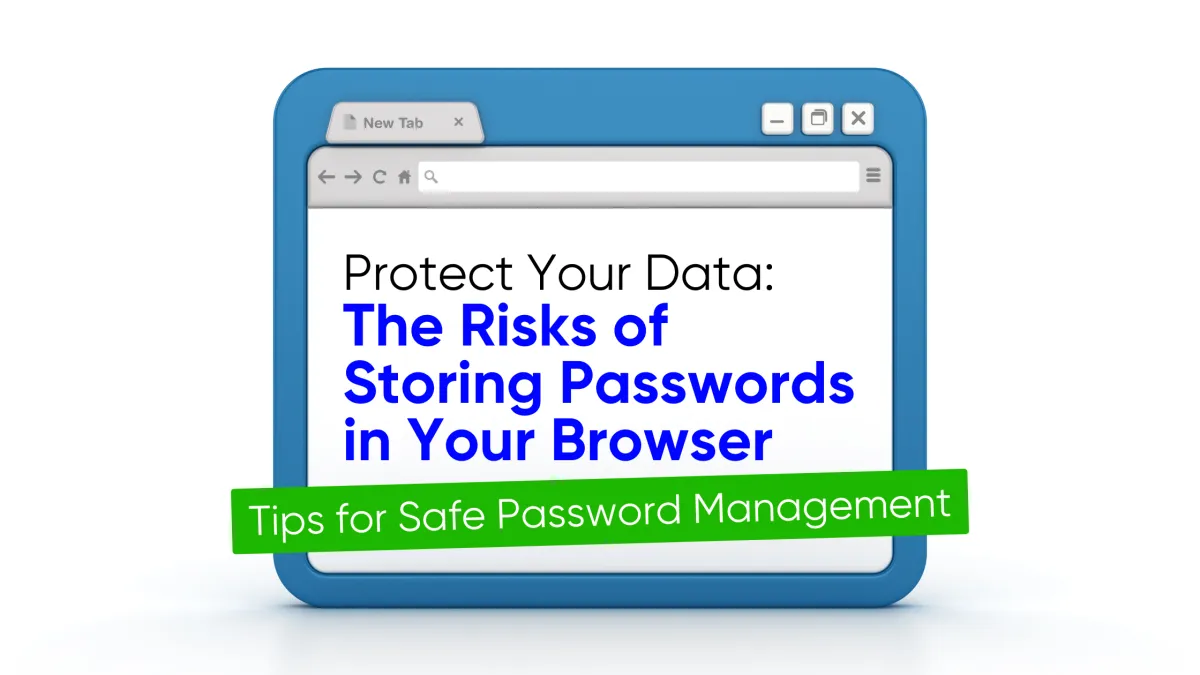You are what you click!
Learn how to make cybersecurity your way of life in an easy and guided way.
You are what you click!
Become Cyber savvy
EXPLORE BLOG BELOW
You are what you click!
Become Cyber savvy
You are what you click!
Become Cyber savvy
You are what you click!
Become Cyber savvy

Protect Your Data: The Risks of Storing Passwords in Your Browser | Tips for Safe Password Management
In today’s digital age, convenience is king. We find ourselves juggling multiple online accounts for work, shopping, and social media, among others.
Imagine a busy city street filled with shops, offices, and restaurants. Each building represents one of your online accounts – from your email and social media to your bank and work files. To enter these buildings, you need a key – your password. But carrying a huge keychain with dozens of keys is cumbersome or remembering all those usernames and passwords can be a hassle,so you opt for a more convenient solution: storing all your keys in a single box, your browser. But how safe is your password in your browser, how safe is your “key box” from hackers, scammers and other threats?
In this blog post, we’ll discuss the risks of storing passwords in browsers and provide tips for safe password management to protect your data.
What is the Risk of Storing Passwords in Browsers?
Browsers, like Chrome, Firefox, and Safari, offer built-in password managers that store and autofill your login credentials for various websites. While this feature undoubtedly makes logging in more convenient, it also poses some serious security concerns
Let’s consider the key box analogy again. Storing all your keys in one place might be convenient, but it also comes with risks, let’s explore them.

a) Vulnerability to malware and hacking attacks:
If a thief manages to break into your key box, they can easily steal all your keys and access every building (account) you own. Similarly, Cybermonsters can exploit browser vulnerabilities or use malware to steal your stored passwords. So, storing passwords in your browser makes them a target for hackers, who can exploit browser vulnerabilities or use malware to steal your stored passwords. This makes you an easy prey.
b) Limited protection:
Imagine your key box is made of cardboard instead of steel. It’s less secure and easier to break into. Browser password managers often lack the robust security features of dedicated password managers, such as encryption or multi-factor authentication.
c) Accessible to others:
If you leave your key box unattended, someone could take a peek and make copies of your keys. In the digital world, if someone gains access to your device, they could potentially access your stored passwords in your browser. In other words, if anyone gains access to your device, they could potentially open any of your accounts as the password is already stored in the browser. This is particularly risky if you don’t have a password set up for your device or don’t use a guest account for others to use.

How Safe Is My Password in My Browser?
The safety of your password in your browser can be compared to how well you protect your key box. If you keep it locked away and hidden from sight, the risk is lower. What does this mean? Your password’s safety in your browser depends on various factors, such as the browser you use, the security settings you have enabled, and your device’s overall security. For example, if you use a strong device password and keep your software updated, that’s why I mentioned the risk is lower.
However, even with these precautions, it’s essential to be aware that storing your password in your browser still poses a risk. Storing your password in your browser is still less secure than using a dedicated password manager.
Tips for Safe Password Management
To keep your digital “keys” safe and minimize the risks of storing your passwords in browsers, consider these simple tips for safe password management:
a) Use a dedicated password manager:
Think of it as upgrading to a high-security steel key box. Password managers like Dashlane, NordPass or 1Password offer robust security features and encryption to keep your passwords safe. They also provide autofill capabilities and generate strong, unique passwords for each of your accounts.
b) Enable multi-factor authentication (MFA):
This is like requiring a fingerprint or secret code in addition to your key to enter a building. MFA adds an extra layer of security by requiring more than just your password to log in. This could be a fingerprint, a text message code, or an authentication app like Google or Microsoft Authenticator.

c) Regularly update your software:
Keep the lock on your key box in good condition by staying up-to-date with browser, operating system, and antivirus software updates. Updating your browser, operating system, and antivirus software protects you against vulnerabilities that Cybermonsters can exploit and reduces the chances of you becoming easy prey.
d) Don’t use the same password for multiple accounts:
If a thief steals one key, they won’t be able to access every building you own. Likewise, using unique passwords for each account minimizes the damage if one account is compromised. In other words, if one of the account is compromised, using unique passwords prevents a hacker from gaining access to your other accounts.

e) Create strong, complex passwords:
A well-crafted key is harder to pick, and a strong password with a mix of letters, numbers, and special characters is more challenging to crack. I love to create meaningful passwords that are strong and provide a difference in the cyber safety of my family. Read the article Five Secrets to Protect Your Passwords for instructions on how you can do it too.. https://sandraestok.com/5-secrets-to-protect-your-passwords/
f) Be cautious with public Wi-Fi:
Imagine an open plaza where thieves can easily snatch your key box from your hands. That’s what public Wi-Fi can be like for your data. Avoid logging into sensitive accounts when connected to public networks such as online banking or work email. These networks can be insecure and make your data more vulnerable to theft.
A Real-World Example
Jane, a busy professional, often finds herself working from coffee shops and using their public Wi-Fi. She stores all her passwords in her browser for convenience, unaware of the risks. One day, while she’s working, a hacker infiltrates the coffee shop’s Wi-Fi network and intercepts Jane’s login credentials as she checks her email. The hacker now has access to her email account and, since she stored all her passwords in her browser, her other accounts as well. Jane’s finances, personal information, and professional life are all at risk.
This story underscores the importance of safe password management and being cautious when using public Wi-Fi or not using it at all. By following the tips mentioned earlier, Jane could have significantly reduced the risk of becoming an easy prey and her passwords being compromised and keeping her data secure.
Conclusion
In our digital city, convenience may be king, but security should always be the top priority. Storing passwords in your browser, like keeping all your keys in one box, may seem like a time-saver, but it can expose you to significant risks. By adopting better password management practices, such as using a dedicated password manager, enabling multi-factor authentication, and creating strong, unique passwords, you can protect your data and maintain a safer online experience.
So, lock up your digital key box and be mindful of your online security. Take the necessary steps to safeguard your passwords, and keep your digital life secure. Remember, you are in charge of your cyber safety!
Did you like this topic? read our cyber safety tips article as well.I would love to hear from you. Leave us your comments below.
5 Secrets to Protect Your Passwords | Sandra Estok
What is browser hijacking How to Spot and STOP (sandraestok.com)
Handling Suspicious Email Attachments: Tips, Risks, and Prevention
Live Happily Ever Cyber!

Sandra Estok
Subscribe for more ways to protect what matters most to you against hackers, scammers, and Cybermonsters™
Latest blog posts:

Protect Your Data: The Risks of Storing Passwords in Your Browser | Tips for Safe Password Management
In today’s digital age, convenience is king. We find ourselves juggling multiple online accounts for work, shopping, and social media, among others.
Imagine a busy city street filled with shops, offices, and restaurants. Each building represents one of your online accounts – from your email and social media to your bank and work files. To enter these buildings, you need a key – your password. But carrying a huge keychain with dozens of keys is cumbersome or remembering all those usernames and passwords can be a hassle,so you opt for a more convenient solution: storing all your keys in a single box, your browser. But how safe is your password in your browser, how safe is your “key box” from hackers, scammers and other threats?
In this blog post, we’ll discuss the risks of storing passwords in browsers and provide tips for safe password management to protect your data.
What is the Risk of Storing Passwords in Browsers?
Browsers, like Chrome, Firefox, and Safari, offer built-in password managers that store and autofill your login credentials for various websites. While this feature undoubtedly makes logging in more convenient, it also poses some serious security concerns
Let’s consider the key box analogy again. Storing all your keys in one place might be convenient, but it also comes with risks, let’s explore them.

a) Vulnerability to malware and hacking attacks:
If a thief manages to break into your key box, they can easily steal all your keys and access every building (account) you own. Similarly, Cybermonsters can exploit browser vulnerabilities or use malware to steal your stored passwords. So, storing passwords in your browser makes them a target for hackers, who can exploit browser vulnerabilities or use malware to steal your stored passwords. This makes you an easy prey.
b) Limited protection:
Imagine your key box is made of cardboard instead of steel. It’s less secure and easier to break into. Browser password managers often lack the robust security features of dedicated password managers, such as encryption or multi-factor authentication.
c) Accessible to others:
If you leave your key box unattended, someone could take a peek and make copies of your keys. In the digital world, if someone gains access to your device, they could potentially access your stored passwords in your browser. In other words, if anyone gains access to your device, they could potentially open any of your accounts as the password is already stored in the browser. This is particularly risky if you don’t have a password set up for your device or don’t use a guest account for others to use.

How Safe Is My Password in My Browser?
The safety of your password in your browser can be compared to how well you protect your key box. If you keep it locked away and hidden from sight, the risk is lower. What does this mean? Your password’s safety in your browser depends on various factors, such as the browser you use, the security settings you have enabled, and your device’s overall security. For example, if you use a strong device password and keep your software updated, that’s why I mentioned the risk is lower.
However, even with these precautions, it’s essential to be aware that storing your password in your browser still poses a risk. Storing your password in your browser is still less secure than using a dedicated password manager.
Tips for Safe Password Management
To keep your digital “keys” safe and minimize the risks of storing your passwords in browsers, consider these simple tips for safe password management:
a) Use a dedicated password manager:
Think of it as upgrading to a high-security steel key box. Password managers like Dashlane, NordPass or 1Password offer robust security features and encryption to keep your passwords safe. They also provide autofill capabilities and generate strong, unique passwords for each of your accounts.
b) Enable multi-factor authentication (MFA):
This is like requiring a fingerprint or secret code in addition to your key to enter a building. MFA adds an extra layer of security by requiring more than just your password to log in. This could be a fingerprint, a text message code, or an authentication app like Google or Microsoft Authenticator.

c) Regularly update your software:
Keep the lock on your key box in good condition by staying up-to-date with browser, operating system, and antivirus software updates. Updating your browser, operating system, and antivirus software protects you against vulnerabilities that Cybermonsters can exploit and reduces the chances of you becoming easy prey.
d) Don’t use the same password for multiple accounts:
If a thief steals one key, they won’t be able to access every building you own. Likewise, using unique passwords for each account minimizes the damage if one account is compromised. In other words, if one of the account is compromised, using unique passwords prevents a hacker from gaining access to your other accounts.

e) Create strong, complex passwords:
A well-crafted key is harder to pick, and a strong password with a mix of letters, numbers, and special characters is more challenging to crack. I love to create meaningful passwords that are strong and provide a difference in the cyber safety of my family. Read the article Five Secrets to Protect Your Passwords for instructions on how you can do it too.. https://sandraestok.com/5-secrets-to-protect-your-passwords/
f) Be cautious with public Wi-Fi:
Imagine an open plaza where thieves can easily snatch your key box from your hands. That’s what public Wi-Fi can be like for your data. Avoid logging into sensitive accounts when connected to public networks such as online banking or work email. These networks can be insecure and make your data more vulnerable to theft.
A Real-World Example
Jane, a busy professional, often finds herself working from coffee shops and using their public Wi-Fi. She stores all her passwords in her browser for convenience, unaware of the risks. One day, while she’s working, a hacker infiltrates the coffee shop’s Wi-Fi network and intercepts Jane’s login credentials as she checks her email. The hacker now has access to her email account and, since she stored all her passwords in her browser, her other accounts as well. Jane’s finances, personal information, and professional life are all at risk.
This story underscores the importance of safe password management and being cautious when using public Wi-Fi or not using it at all. By following the tips mentioned earlier, Jane could have significantly reduced the risk of becoming an easy prey and her passwords being compromised and keeping her data secure.
Conclusion
In our digital city, convenience may be king, but security should always be the top priority. Storing passwords in your browser, like keeping all your keys in one box, may seem like a time-saver, but it can expose you to significant risks. By adopting better password management practices, such as using a dedicated password manager, enabling multi-factor authentication, and creating strong, unique passwords, you can protect your data and maintain a safer online experience.
So, lock up your digital key box and be mindful of your online security. Take the necessary steps to safeguard your passwords, and keep your digital life secure. Remember, you are in charge of your cyber safety!
Did you like this topic? read our cyber safety tips article as well.I would love to hear from you. Leave us your comments below.
5 Secrets to Protect Your Passwords | Sandra Estok
What is browser hijacking How to Spot and STOP (sandraestok.com)
Handling Suspicious Email Attachments: Tips, Risks, and Prevention
Live Happily Ever Cyber!

Sandra Estok
Subscribe for more ways to protect what matters most to you against hackers, scammers, and Cybermonsters™
Stop Hackers, Scammers and Cybermonsters in their tracks.
Take charge of your Cyber Life today!
Push Cybermonsters away from your private data.
Subscribe to my newsletter about cybersecurity and cyber safety. New issues every Tuesday.




